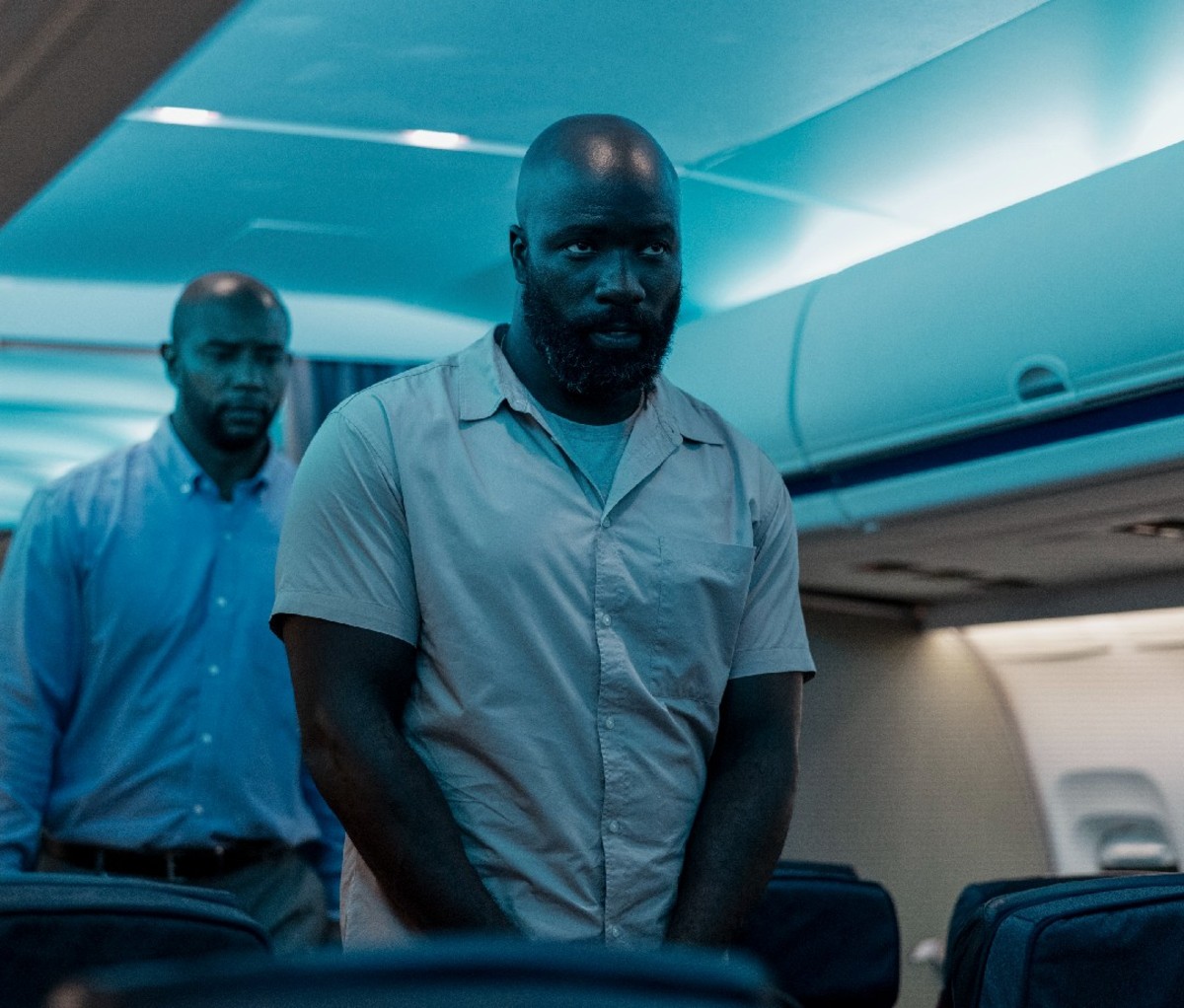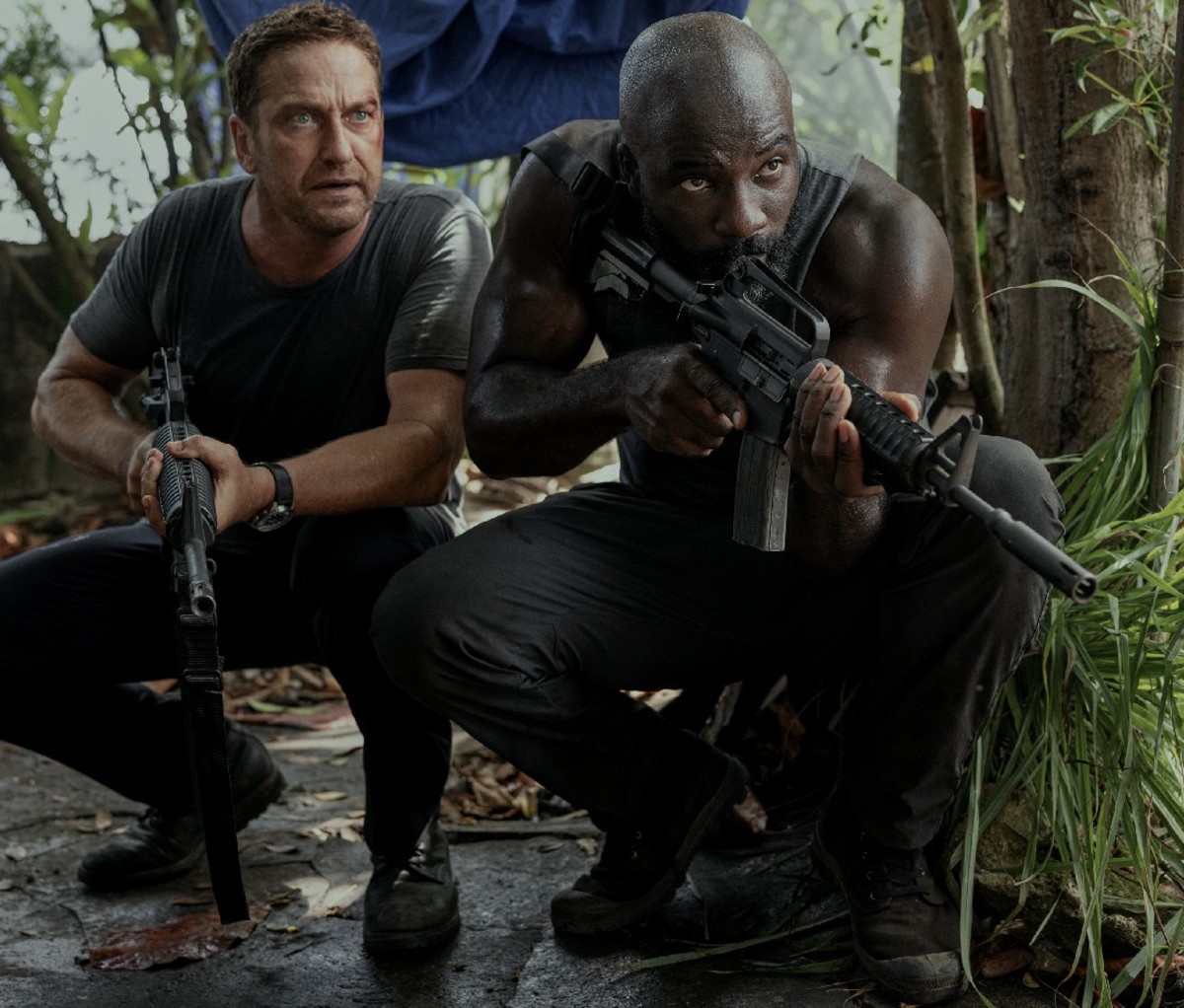How Mike Colter Built a Formidable Physique for ‘Plane’
[ad_1]
Mike Colter is an intimidating man to walk next to. Standing at 6’3” and built like a Mack truck, it doesn’t take long to understand why he was cast to play the steel-skinned Luke Cage by Marvel and Netflix. His physical stature paired with a natural acting ability has made him a presence impossible to ignore onscreen. So when the producers behind Plane were looking for someone to go head to head with brawny Gerard Butler, Colter was an easy choice.
In Plane, Colter plays Louis Gaspare, an enigmatic veteran who boards the titular plane as a prisoner charged with murder. The former French Foreign Legion fighter is armed with plenty of mystery—and muscles. Men’s Journal spoke with Colter about prepping to take on the role, filming in the rainforests of Puerto Rico, and recovering from the grueling routine.
Men’s Journal: How did you first become attached to Plane with Gerard Butler?
Mike Colter: I was frustrated trying to make some other project happen when this one entered my inbox. They sent me the script and I immediately thought it could be interesting to do. I knew work the director [Jean-François Richet] had done, like Assault on Precinct 13. I then had the opportunity to meet Gerry, who was incredibly cool to be around and I could see he was going to make a great producer. I was also excited when I heard we’d be filming in Puerto Rico because I’d never really spent time there. It seemed like a great location and crew.

Eventually we find out your character is military—specifically French Foreign Legion. How did you train for this?
Playing someone who used to be French Foreign Legion means approaching situations like a soldier, even if the audience doesn’t know why I’m doing what I’m doing. From the beginning, when he’s put in the back of the plane, he’s like a wild animal looking for a way out—and he knows what to look for. I’ve been lucky enough to accumulate a fair amount of knowledge in tactics over the many action projects I’ve done.
There are real weapons we’re using, and gun safety is paramount. The guns could be set up with half loads or quarter loads, which refers to the amount of gun powder that’s actually used. There are a lot of great technical advisors and former military who work on projects like this. For Plane, I think we had four former military [personnel] on set. They have their own approaches. I built a way of working in those scenarios that’s authentic, but also my own.
Eventually you and Butler’s character come to depend on each other. Did you guys get a chance to connect off-set?
Gerry and I were staying at the same resort in Puerto Rico, the St. Regis. It was funny because we would be getting up in the morning to work out or go out into the jungle to film these intense scenes and everyone around us was in vacation mode. I’m sure I got a few odd looks from people after a long day when they were coming back from poolside cocktails, but it made for a great place for me and Gerry to grab dinner a few times a week to discuss the scenes and what we thought about the day’s takes.
One of the former military members in the cast is Remi Adeleke, who plays a military contractor sent out as part of the rescue operation. How was it working with him?
I was excited when Remi Adeleke came aboard the project. His background as a Navy SEAL brought a lot to the production and he did amazing work in his scenes. It’s great to have someone who can operate the weapons and gear very naturally. Doing things like cocking and maneuvering guns are second nature to him, which we all can learn from and pick up on.

You’ve done your share of physically intimidating roles, including Luke Cage in the popular Netflix series. Did you have to do anything differently in the gym?
I wanted to put on a good amount of size for this film, so it started with ramping up my weight training quite a bit. I did a lot of heavy deadlifts, squats, bench presses, and made sure I was lifting weights in a way that wouldn’t just make me look big but had me feeling powerful. I’ve collected a lot of routines and exercises from trainers I’ve worked with, building my own program out of everything I’ve done in the past to keep in striking distance of a superhero-type body. I’m not sure I’ll get the call to do another appearance as Luke Cage, but if I ever do I’ll be ready.
Where were you doing most of that strength work?
I’ve got a pretty decent setup at home with weights and kettlebells that I can use when getting ready for these projects. The St. Regis where we were staying had a fantastic gym, with everything from racks for deadlifts to bumper plates and kettlebells. I also bring my TRX system with me when I travel. It’s a great way to use your bodyweight to stay strong on the road. That, in addition to a physio ball, is a great way to challenge the muscles. Hit some chest flyes on that and you’ll feel demolished.
Your character is rocking a sleeveless shirt in the jungle, so I’m guessing bulging biceps was a goal. How did you blast your arms from all angles?
I saw that in the script and in the wardrobe, so of course I wanted to make sure my arms looked like they should. I have a few circuits that are great at building muscle and definition in the arms and shoulders. My routine includes face pulls with cables to get the rear delts going and a lot of pullups. Combining that with all the heavy lifts I was already doing helped up human growth hormone and made sure I was seeing the results.
Soldiering through the jungle takes a fair amount of endurance as well. How did you train your cardio?
I like playing basketball to stay healthy, but on set or at the hotel there wasn’t much chance to do that, so I had to pick up my cardio in other ways. I hit the assault bike quite a bit in Puerto Rico—and that thing really tears you up. I would go into the gym and stare at it, knowing I was going to conquer it at some point that day. Some days I’d kick off my session with that to get my body warmed up in the most brutal way. Other mornings, I’d finish up with it. Either way, I was staggering out those assault bike sessions. When I had time, I’d go out on the beach and do sand sprints, which are low impact and easier on the joints. The beach itself adds to the training because you have to focus on your stability on the uneven surface.
How did putting on size for this role change your eating habits?
Most of the year I do intermittent fasting, not touching any food until around noon or so. But while preparing for the movie I started eating in the morning because I wanted to keep the bulk I had put on. I’d eat breakfast, then follow that with a protein shake. On set, I’d follow lunch with another protein shake. For dinner, I would make sure it was a large entrée of protein with two appetizers and made sure I got plenty of carbs in there as well to keep my energy up.
Early-morning workouts followed by 12 hours of filming in the jungle sounds punishing. How did you recover?
The first thing I wanted to do every day after getting back from the jungle was go somewhere cool. It was usually around 100 degrees outside with crazy humidity, and I’d be pouring sweat. Luckily, the resort had a cold plunge and sauna, so I was using those almost every day. I kept my hotel room around 68 degrees just so I could get some quality rest. I don’t think people put as much focus on sleep as they should. That was the most important part of my day.
Have you incorporated contrast therapy into your everyday recovery as well?
I’ve had a sauna from Enlighten for a while up in my New York place. But after seeing the benefits of the plunge while I was filming, I decided to get one. One of the actors from the movie, Oliver Trevena, had one at his place, so I asked him for some advice. I ended up getting a plunge from Renu Therapy, which has been great. I had room on the roof deck of my New York home and it fits great with the sauna. I like the mental benefit as well—forcing myself to get into freezing water when it’s already just 10 degrees outside. There’s a great feeling that comes during and after, which can become a little addictive. Now it’s just about finding the best combination and frequency, which I’m experimenting with all the time.
Plane from Lionsgate is now playing in theaters.
For access to exclusive gear videos, celebrity interviews, and more, subscribe on YouTube!
[ad_2]
Source link


